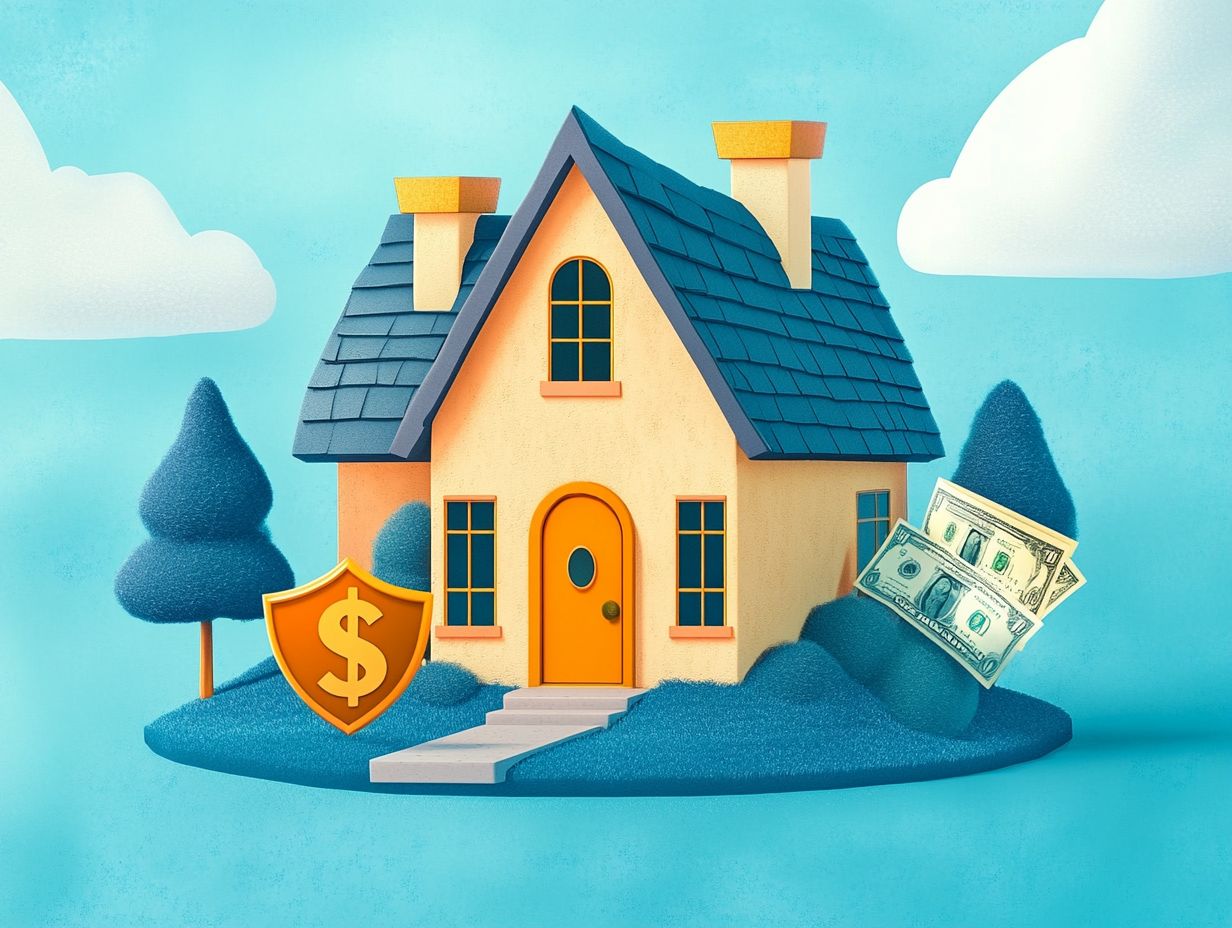8 Key Facts About Home Insurance Coverage
Navigating the world of home insurance may seem daunting, but grasping its intricacies is vital for safeguarding your investment.
This article highlights eight essential facts every homeowner should be aware of. You ll explore the variations in coverage policies, the essentials included in basic plans, and the additional options available for unforeseen events. Consider this your comprehensive guide through the landscape of home insurance.
You will learn how to effectively manage your premiums, file claims with confidence, and ensure your belongings are adequately covered. Whether you’re a first-time buyer or reevaluating your existing policy, this information is indispensable for making informed decisions about your home insurance needs.
Contents
- Key Takeaways:
- 1. Home Insurance Coverage Varies by Policy
- 2. Basic Coverage Typically Includes Dwelling, Personal Property, and Liability
- 3. Additional Coverage Options for Natural Disasters, Theft, and Other Events
- 4. Factors That Affect Home Insurance Premiums
- 5. Home Insurance Does Not Cover Everything
- 6. Importance of Accurate Replacement Cost Estimation
- 7. How to File a Home Insurance Claim
- 8. Discounts and Savings Opportunities
- What to Consider When Choosing a Home Insurance Policy?
- What Are the Most Commonly Excluded Events in Home Insurance?
- What Are the Different Types of Home Insurance Policies?
- How Can Homeowners Lower Their Insurance Premiums?
- What Are the Steps to Take After Experiencing a Loss?
- How Can Homeowners Ensure Adequate Coverage for Personal Belongings?
- Watch This Video for More Insights
Key Takeaways:

Home insurance coverage varies depending on the policy, so it’s important to carefully review and understand what to look for in home insurance coverage. Basic coverage typically includes dwelling, personal property, and liability, but additional options are available for natural disasters, theft, and other events. Factors such as location, age of home, and previous claims can affect home insurance premiums.
1. Home Insurance Coverage Varies by Policy
Home insurance coverage can vary significantly based on the specific policy type you choose. To better understand your options, check out the top 10 home insurance FAQs you should know. Different types of home insurance policies, ranging from HO1 to HO8, are tailored to meet different insurance needs and the unique risks associated with property ownership.
This diversity among policies gives you the power to select coverage that aligns perfectly with your individual circumstances.
For example, the HO1 policy offers basic protection for your home and a few essential personal belongings, making it an appealing option if you re seeking affordable, minimal coverage.
On the other hand, the HO3 policy the most common type provides broader protection against a wide array of risks while safeguarding both your home s structure and your personal property.
If you own a high-value home, the HO5 policy might be your best bet, as it offers coverage for nearly all risks.
Understanding these nuanced differences enables you to make informed decisions that reflect your lifestyle, financial stability, and the value of your property.
2. Basic Coverage Typically Includes Dwelling, Personal Property, and Liability
Basic homeowners insurance coverage typically includes dwelling coverage to protect the physical structure of your home, personal property coverage for your belongings, and liability coverage for your legal responsibilities. This ensures comprehensive protection.
Understanding these components is essential for anyone looking to safeguard their investment. Dwelling coverage specifically focuses on your home itself, covering repairs or reconstruction from events like fire or storms, effectively shielding you from significant financial loss.
Personal property coverage extends to items such as furniture, electronics, and clothing, ensuring that if your belongings are damaged or stolen, you can replace them without facing crippling expenses.
Liability coverage protects you against claims for injuries or damage to others while on your property, covering legal fees and settlements. Being aware of coverage limits enables you to assess your risks accurately and make informed decisions about whether additional coverage is necessary.
3. Additional Coverage Options for Natural Disasters, Theft, and Other Events

Don t wait! Consider additional coverage to protect your property from disasters and theft, thereby enhancing your overall insurance protection.
In today s unpredictable climate, relying solely on standard homeowners insurance may leave you exposed to potential risks. If you reside in a flood-prone area, you ll likely discover that regular policies don t cover water damage, making specialized flood insurance essential for complete peace of mind.
If you live in a region prone to earthquakes, exploring earthquake endorsements can significantly mitigate your financial loss from such events.
By looking into these tailored policies, you can effectively address your unique challenges, ultimately reinforcing your financial security and safeguarding your assets against unforeseen threats.
Take charge of your home s safety today. Review your insurance policy and consult an expert to ensure you re fully covered.
4. Factors That Affect Home Insurance Premiums
Several factors influence your home insurance premiums, including the current market conditions, risks associated with your property, the coverage limits you choose, and the deductible amounts you set. Each of these can lead to significant financial impacts.
Understanding how these factors work lets you make informed choices. For instance, your property’s location plays a pivotal role; homes in areas susceptible to natural disasters like floods or earthquakes typically face higher premiums due to the increased risk of damage.
The overall value of your home greatly matters. More valuable properties require more comprehensive coverage, which can naturally drive up costs. Your credit score also comes into play, as insurers often view lower scores as indicators of a higher likelihood of claims, resulting in adjusted rates.
Recognizing these factors helps you navigate the complexities of securing affordable home insurance and understanding common myths about home insurance.
5. Home Insurance Does Not Cover Everything
It’s essential for you as a homeowner to recognize that your home insurance doesn’t cover everything. For a better understanding of what is included, consider reviewing the key features of comprehensive home insurance. Specific exclusions might include flood damages or acts of war, leaving you unprotected in certain scenarios.
Many policies clearly exclude damages from acts of war and neglect. Plus, specific natural disasters like floods or earthquakes often require separate policies, which can create gaps in your coverage.
These exclusions can have serious implications; if disaster strikes, you might face hefty repair bills that your insurance won t cover. Being aware of these limitations is crucial for you. This knowledge empowers you to make informed decisions and assess whether you might need supplemental coverage to shield your home from potential risks.
6. Importance of Accurate Replacement Cost Estimation

Accurate replacement cost estimation is crucial for homeowners like you, as it determines the amount of coverage necessary to replace your home. This ensures you are adequately protected during insurance claims, sparing you from financial hardship.
Understanding the distinction between replacement cost and actual cash value is vital. Replacement cost means what it costs to rebuild your home. Actual cash value considers wear and tear, so it pays less.
This difference can significantly impact your financial recovery after a disaster. Familiarizing yourself with these terms empowers you to select an insurance policy that truly meets your needs, enabling you to navigate potential losses with confidence.
With the right coverage, you can secure peace of mind, knowing you are protecting your greatest investment.
7. How to File a Home Insurance Claim
Filing a home insurance claim is crucial. Pay close attention to detail to ensure you report damages accurately and secure the financial protection you deserve from your insurance provider.
Before you dive into the claim, take a moment to assess the extent of the damage. Capture clear photographs and note all affected areas quickly this documentation is vital for your claim!
Next, reach out to your insurance agent for guidance. It s crucial to grasp the specific terms of your policy and inquire about any deductible that may apply. Familiarizing yourself with the estimated timeline for the claims process will help manage your expectations.
By following these steps, you can facilitate a smoother experience and set the stage for a swift resolution.
8. Discounts and Savings Opportunities
Homeowners insurance offers a treasure trove of discounts and savings opportunities that can significantly lower your premiums, especially when you collaborate with an experienced insurance agent.
You might discover savings through multi-policy discounts, which reward you for bundling your auto and home insurance. Enhancements to your home security like installing alarms or deadbolts can lead to further cost reductions.
If you re a loyal customer, you could reap the benefits of loyalty programs that grant discounts after you ve maintained coverage for a certain number of years. By actively exploring and understanding these options, you can secure adequate protection for your property while keeping your insurance expenses manageable.
What to Consider When Choosing a Home Insurance Policy?

When selecting a home insurance policy, weigh various factors, including coverage options that align with your specific needs and the requirements set by your mortgage lender. To avoid pitfalls, it’s helpful to understand common home insurance myths and also consider the level of financial protection you desire.
Assessing your personal needs is critical; determining if you require additional coverage for natural disasters or personal belongings can help tailor the policy to suit your unique circumstances.
Understanding coverage limits and deductibles is equally important. These elements will influence your out-of-pocket costs during claims.
Engaging with an insurance agent offers valuable insights and guidance, making it easier to navigate the myriad choices available.
Through expert consultation, you can pinpoint potential gaps in coverage and ensure your policy adequately protects your most valuable asset.
What Are the Most Commonly Excluded Events in Home Insurance?
Homeowners insurance policies often exclude events like flooding, earthquakes, and intentional damage. To fully protect yourself, it’s important to understand the top considerations for home insurance types, as this can help you secure additional specialized coverage.
These exclusions are mainly due to the higher risks associated with these events, which can lead to significant claims that destabilize insurance providers.
For example, flooding can wreak havoc on your property, which is why many policies require separate flood insurance, typically provided through the National Flood Insurance Program.
Earthquakes are notoriously unpredictable, prompting insurers to recommend separate earthquake policies for those in high-risk areas.
It s also crucial to recognize that intentional damage is excluded, as it undermines the purpose of insurance.
Carefully reviewing your policy details helps you understand these limitations, so you can explore additional coverage options tailored to your needs.
What Are the Different Types of Home Insurance Policies?
As a homeowner, you have a wealth of policy options, ranging from HO1 to HO8 types of homeowners insurance. It’s crucial to understand what to know before buying home insurance, as each type is designed to meet distinct needs and levels of coverage.
Whether you’re looking for basic protection as a renter or comprehensive coverage for a luxury estate, these policies accommodate a diverse array of homeowner profiles.
If you prefer a no-frills approach, the HO1 offers minimal coverage, perfect for those seeking the essentials. The HO3 serves as the gold standard for most homeowners, delivering extensive protection against various risks. If you own a high-value home, the HO5 is designed for you, providing broader coverage and fewer exclusions to safeguard your investment.
By grasping these nuances, you can select the right policy that aligns with your unique circumstances, ensuring you have the security you need for your specific living situation.
How Can Homeowners Lower Their Insurance Premiums?
Want to lower your insurance premiums? Here s how you can take action today!
You can effectively lower your premiums by taking advantage of various discounts, implementing safety measures, and continuously reviewing your coverage options with an insurance agent.
Bundling multiple insurance policies, such as home and auto, may yield substantial savings since many providers offer lower rates for combined coverage.
Enhancing your home security with features like alarm systems and deadbolts not only protects your property but might also qualify you for discounts.
Increasing your deductibles can further decrease your premiums, although it’s wise to understand the potential out-of-pocket costs you might face during a claim.
Regularly assessing your existing policy with an informed agent ensures you stay updated on available savings and make necessary adjustments as your life circumstances change.
What Are the Steps to Take After Experiencing a Loss?
After experiencing a loss, you need to follow specific steps to navigate the insurance claims process effectively and secure the financial protection you’re entitled to under your homeowners insurance policy.
First and foremost, it s essential to assess the situation safely. Take immediate actions to prevent further damage. This might mean shutting off utilities or covering broken windows. Your swift response can make a significant difference.
Next, carefully note down all damages. Snap photos and create a detailed list of affected items. This evidence is crucial for your claim!
Once you’ve addressed the immediate concerns, reach out to your insurance agent. A knowledgeable agent will guide you on the next steps, help identify necessary forms, and clarify coverage details, ensuring a smoother claims process that may lead to faster compensation.
How Can Homeowners Ensure Adequate Coverage for Personal Belongings?
To ensure you have adequate coverage for your personal belongings, accurately assess your possessions and understand the coverage limits of your homeowners insurance policy.
Start by creating a detailed inventory of your items. Document each one along with its estimated value, receipts, or photographs. This process helps you keep track and clarifies what is covered, greatly influencing your overall financial protection especially in the unfortunate event of a disaster.
Be mindful that certain items, like jewelry or artwork, may exceed the standard coverage limits. Therefore, exploring additional coverage options becomes crucial for safeguarding these high-value possessions, providing you with peace of mind and financial security in your home.
Watch This Video for More Insights





